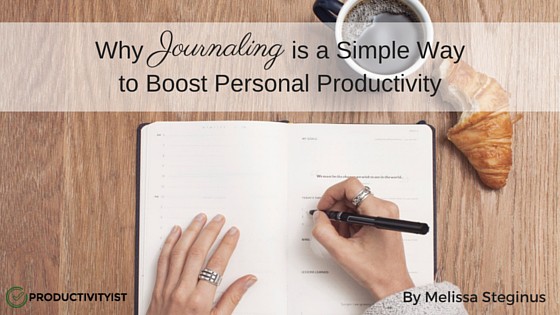
I’m a firm believer in looking inward to find ways to move ahead. For me, journaling is a powerful tool in this process. Putting pen to paper on a regular basis – even if for only a few minutes per day – deepens your connection to the work you’re doing. This simple step allows you to review your progress and helps ensure that you move in the right direction.
Reviewing your work and how you feel about your work is something Productivityist heavily emphasizes. Mike encourages our team to conduct self-reviews bi-weekly, quarterly, and yearly.
Review is essential to evaluation, which is essential to progress.
Journaling (or, if you prefer, recording or documenting) is the key tool to help you with the review process.
Journaling Builds Awareness
Journaling clarifies jumbled thoughts and feelings. When you know where the problems lie, this allows you to focus on what you enjoy, struggle with, and want to pursue.
It also allows you to review the past so you can assess and improve the present. While the past may be over and done with, your past continues to impact you today.
Think about your habits, ideals, and goals. These didn’t just fall out of the sky, did they? Not likely. They developed from the past. The challenge lies in that it can be tough to remember how it all came to be.
Journaling is a great way to pay attention to “how it all came to be.” In looking back, you gain insight into (and often appreciation for) your challenges, lessons, and perseverance. You take what you know and apply it to how you want to grow.
Journaling Builds Confidence
When you deepen your awareness of your past (and present) through journaling, you will see definitive patterns emerge. The ability to look back on what you’ve done gives you confidence to make decisions that move you toward what you want.
How many times have you looked at your current circumstances and wondered, “How did I get here?” or “What would things look like if I had done A instead of B?”
Sometimes the answer is clear. Other times, not so much. If you keep a journal, the odds are good that you could flip through the pages, add up a few events or decisions, and find the answer.
“How did I get here?”
Flip, flip, flip (or scroll, scroll, scroll if you’re into digital journaling).
“Well X led to Y, and then Z happened, which prevented me from doing W.
Wow, I really miss doing W. I’m going to do some W today.”
And that is the power of journaling. You review the past to assess the present and determine what actions are necessary to change your future.
The confidence you gain through breaking down your past choices will (gradually) encourage you to trust yourself. It wasn’t that you didn’t have the power or desire to do W; you were just dealing with X, Y, and Z.
This knowledge and trust reduces stress and anxiety, empowers you to make big decisions, and propels you towards your goals.
Journaling Builds Momentum
One thing that Mike has said sticks out in my mind when it comes to journaling. He said, “Your brain is meant to be a factory, not a warehouse.”
Journaling clears the mind of unproductive storage to make space for the important stuff. The stuff you want to do. The stuff you want to move forward.
In this article, Mike states, “[Journaling] helps me drill deep into what I ultimately want to do and helps me achieve it.”
Journaling helps you prioritize A when B through Z try to compete for your attention. It’s what’s shows you how you balanced A, B, and C in the past so you can now manage D through F. It’s what gives you the confidence to make a decision when you reach a fork in the road with two, four, or 26 potential paths.
Journaling is about addressing and recording thoughts, feelings, and actions. While this can be a bit intimidating at first, regular practice can:
– Deepen your awareness and connection to your work and yourself
– Give you clarity and confidence to make important decisions
– Propel you towards what you want to accomplish
Ready to dive in? Please do! Check out this podcast to learn how you can use a journal to increase your productivity by 23%.